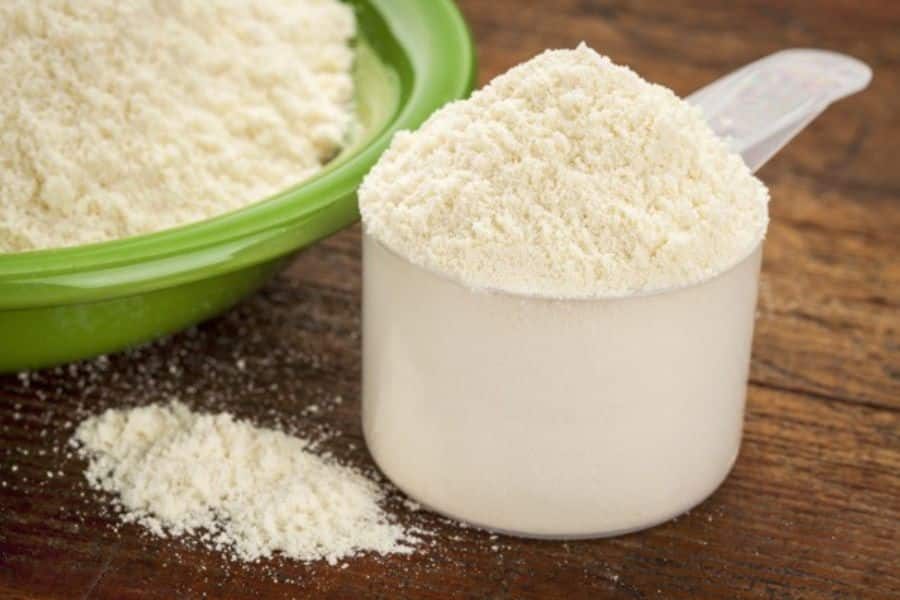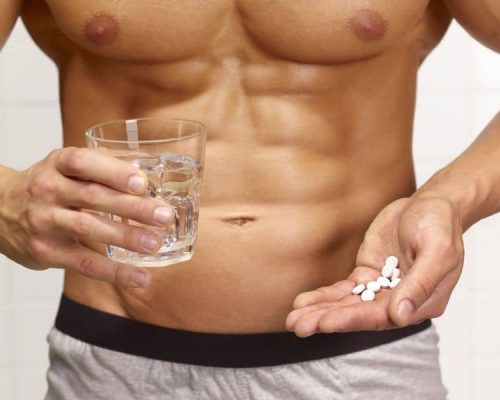Understanding Protein Powders
Protein powders are a go-to for folks looking to jack up their protein game. Wrapping your head around the basics can help make you a smart cookie when it comes to picking the right one.
Why Your Body Craves Protein
Protein is a big deal for a ton of body stuff. Think of it as the building block for repairing muscles, whipping up enzymes and hormones, and keeping your immune system in tip-top shape. If you’re pumping iron or aiming to get swole, gulping down enough protein is an even bigger must.
Per the Harvard Health Publishing, protein powders can be your buddy, but you gotta be in-the-know about what’s in them—especially if they’re packing fake additives or nasty chemicals.
Your Protein Powder Playlist
Protein powders come in all kinds of flavors with their own vibes. Here’s the scoop on some that folks often reach for:
Whey Protein
This one’s squeezed out of milk and is packed with every essential amino acid you’ve heard of. It’s like the Usain Bolt for absorption, which makes it perfect right after you’ve worked up a sweat. For more deets, hop over to our piece on whey protein powder benefits.
| Type | Source | Pros | Cons |
|---|---|---|---|
| Whey Protein | Milk | Quick absorption, complete amino profile | Not the best for those who can’t handle lactose |
Casein Protein
Another milk wizard, Casein digests like a slow cooker, slowly letting out amino acids. Makes it just the thing for your late-night protein munch.
| Type | Source | Pros | Cons |
|---|---|---|---|
| Casein Protein | Milk | Long-lasting amino supply | Sorry, lactose-intolerant pals |
Plant-Based Protein
Made from stuff like peas, rice, hemp, and soy, this one’s a winner for vegans or the lactose-averse. More insights can be found in our protein powder for lactose intolerant guide.
| Type | Source | Pros | Cons |
|---|---|---|---|
| Plant-Based Protein | Plants like peas and soy | Vegan-friendly, hypoallergenic picks | Might skip some amino acids |
| Plant Protein Type | Source | Protein Goal (per 30g) |
|---|---|---|
| Pea Protein | Yellow Split Peas | 24g |
| Brown Rice Protein | Brown Rice | 22g |
| Hemp Protein | Hemp Seeds | 15g |
| Soy Protein | Soybeans | 25g |
Egg Protein
Egg protein is all about egg whites, offering a no-nonsense, high-quality protein deal that’s simple to digest and dairy-free.
| Type | Source | Pros | Cons |
|---|---|---|---|
| Egg Protein | Egg Whites | Easy on the stomach, premium protein | Might bother those with egg allergies |
Knowing these protein flavors helps you pick the one that vibes with your diet and fitness mojo. When choosing a protein, watch for clean labels and stick to the natural stuff, dodging artificial sweeteners. Check out our top picks for best protein powder for building muscle and protein powder for weight loss.
Artificial Sweeteners in Protein Powders
When you’re on the hunt for a protein powder without any of those sneaky artificial sweeteners, it’s a good idea to get the lowdown on what these sugary stand-ins might mean for your body. Let’s gab about the health bits and the rules these ingredients play by.
Health Implications of Artificial Sweeteners
These sweeteners, like aspartame, saccharin, and sucralose, sneak their way into protein powders to give you that sweet taste minus the calorie punch. Sure, they might help you dodge cavities or shed a few pounds if you’re carrying extra baggage.
But, let’s not sugarcoat it; there’s more under the surface. Some folks have raised eyebrows about these sweeteners being linked to issues like wonky metabolism, trouble in glucose town, insulin hiccups, and tummy troubles. Before you scoop that protein into your shake, it’s a wise idea to know what you’re potentially signing up for.
| Health Perks | Possible Problems |
|---|---|
| Fewer cavities | Funky metabolism |
| Short-term weight drop | A glucose glitch |
| No sugar spikes | Insulin issues |
| Okay for most healthy folks | Gut grumbles |
FDA Regulations on Sweeteners
Over in the U.S., the Food and Drug Administration (FDA) keeps an eye on these sugar swaps. Aspartame, saccharin, and sucralose, got the thumbs-up from the FDA. Sugar alcohols like sorbitol and xylitol also made the cut and aren’t boxed in as food additives (Mayo Clinic).
It’s wise to double-check if the protein powder you’re eyeing meets these FDA nods. If you’re curious about what’s allowed and how much is okay to guzzle, the FDA website has you covered. Playing by these rules helps dodge health hiccups.
If dodging artificial sweeteners is your jam, there are loads of natural options out there. They let you keep the sweet while steering clear of potential artificial pitfalls.
By getting clued up about the health factors and the ground rules, you can smartly snag the top protein powder for muscle gains or whatever suits your unique plan like protein powder for keto dieters. Look at both the good and the maybe-not-so-great, making sure you pick what’s best to hit your health bullseye.
Risks of Artificial Sweeteners
Let’s face it, knowing what goes into your protein powder is key to keeping things healthy and effective. Here, we’re spilling the beans on those sneaky nasties that sometimes hitch a ride in your favorite workout buddy, which could be bad news for your health.
Toxic Chemicals in Protein Powders
Mixing up a protein shake might feel like the healthy thing to do, but hold up—there are added extras in some that aren’t doing you any favors. We’re talking about spooky stuff like:
- Lead
- Arsenic
- Cadmium
- Mercury
- BPA
- Pesticides
These baddies aren’t just in fairy tales; they’ve been linked to some seriously nasty stuff, including cancer and other lifelong health problems, believe it or not (Harvard Health Publishing).
| Toxic Chemical | Scary Side Effects |
|---|---|
| Lead | Brain damage, kidney trouble |
| Arsenic | Skin problems, cancer, heart disease |
| Cadmium | Wrecks kidneys, messes with bones |
| Mercury | Hurts your brain and growth |
| BPA | Messes with hormones |
| Pesticides | Cancer risk, harms reproductive health |
Potential Health Risks
Not all sugar substitutes are sweet deals. Stuff like sucralose and acesulfame potassium in protein powders might leave you with wonky health and metabolism, throwing you off your athletic game. Add these to your daily grind, and you might face:
- Metabolic struggles
- Blood sugar issues
- Insulin hiccups
- Gut grumbles
Even if these sweet friends aren’t messing with your muscle gains, they can still tinker with your belly and metabolism. Eating them in small doses is the way to go.
| Health Issue | Possible Trouble |
|---|---|
| Metabolic Meltdown | Weight woes, diabetes |
| Sugar Spike Issues | Bad blood sugar days |
| Insulin Snags | Higher diabetes risk |
| Gut Changes | Belly woes, stomach rumbling |
Load up on these sweeteners, and you might be dialing up your risk for type 2 diabetes and other health quirks. There’s still a lot to learn about the long-term fallout from using these sugar swaps (Mayo Clinic).
Knowing what you’re adding to your shake makes it easier to pick a winner that lines up with your health and body goals. If you’re hunting for a clean scoop, check our tips for protein powder without artificial sweeteners. Got other goals? Dive into our takes on protein powder for weight loss, protein powder for women, and protein powder for those avoiding dairy.
Natural Alternatives to Sweeteners
Searching for a protein shake that doesn’t taste like chemicals? Considering natural options is a smart move. You get sweetness and a side of health benefits.
Fruit as Natural Sweeteners
Fruits—nature’s candy—are a top pick for sweetening protein powders and foods without those dreaded empty calories. They bring sweetness, sure, but they also sprinkle in things like antioxidants and fiber. Some fruity favorites include:
- Bananas: A classic. They bring in sweetness and a creamy texture.
- Melon: Refreshing and hydrating.
- Mangos: Little balls of sunshine.
- Apples: Both sweet and tart, depending on the variety.
- Berries: Small but mighty, packed with flavor.
ATH Sport suggests blending these fresh wonders into your protein shakes. They transform plain shakes into tasty vitamin-packed snacks.
Natural Sweeteners in Protein Powders
Several naturally sweet options have started popping up in protein powders, each with its own perks:
- Honey: Sweet, sticky, and with a golden glow.
- Yacon Syrup: Say hello to this new guy on the sweet street.
- Coconut Sugar: A subtle sweetness with a bit of a nutty twist.
- Molasses: Dark, rich, and full of character.
- Maple Syrup: Pour on the sweet, with a hint of Canada.
While they taste great and have a few nutrients, it’s all about balance. The long-term effects are still a bit of a mystery.
Here are more sweet choices often mixed into protein powders:
| Natural Sweetener | Key Benefits |
|---|---|
| Stevia Leaf Extract | Zero calories, no sugar spikes, and sweetness in slow-mo |
| Monk Fruit Extract | Sweetness overload, 200 times more than sugar |
| Date Paste | Sweet with a touch of caramel, adds fibers too |
Stevia and Monk Fruit are sweet deals for those watching their calories, perfect for sticking to a keto diet (Genetic Nutrition). Date Paste, made from real dates, adds a natural caramel zing ideal for any shake or smoothie.
Curious about the best protein powders for specific needs? You’re in luck—check out our articles on the best protein powder for building muscle and the lowdown on protein powder for seniors.
Protein Powders Without Artificial Sweeteners
Keeping up with your protein needs without the fake stuff is easy thanks to some quality options out there. Here’s a look at some top no-fluff, no-nonsense plant-based protein powders.
Top Unflavored Protein Powders
If you’re all about keeping it simple, unflavored protein powders give you a pure protein hit without any of the extras. Check these out:
-
Naked Whey Plain: This bad boy has just one ingredient—yep, just one. Grass-fed whey protein. With 25 grams of protein per serving, it’s the go-to for those who want their protein straight up (thanks, Samantha Cassetty).
-
Simply Fuel Chickpea Protein Powder: It offers 20 grams of protein and 5 grams of fiber per serving. This one’s great for throwing into recipes for a nutritional kick.
| Product | Protein (g) | Fiber (g) | Key Feature |
|---|---|---|---|
| Naked Whey Plain | 25 | 0 | One-ingredient simplicity |
| Simply Fuel Chickpea | 20 | 5 | Multi-use blend |
Unsweetened Plant-Based Protein Powders
Craving something plant-based? These unsweetened options do the trick:
-
Bob’s Red Mill Almond Protein Powder: With almonds at the core, this one packs 20 grams of protein, 6 grams of good fats, and lots of calcium per serving. It’s a solid pick for muscle health and keeping you full (Samantha Cassetty).
-
Bob’s Red Mill Hemp Protein Powder: Offering 12 grams of protein and 11 grams of fiber, plus iron galore, it’s perfect for smoothies or savory dishes (Samantha Cassetty).
-
Orgain Organic Simple Vegan Protein Powder: This chocolate-flavored powder is still unsweetened. It hits you with 20 grams of plant-based protein minus the gluten and lactose, and without any funky aftertaste (Amazon).
| Product | Protein (g) | Fiber (g) | Key Feature |
|---|---|---|---|
| Bob’s Red Mill Almond | 20 | 6 | Almond love, did someone mention calcium? |
| Bob’s Red Mill Hemp | 12 | 11 | Fiber and iron superhero |
| Orgain Organic Simple Vegan | 20 | 0 | Choco delight, sans guilt |
These picks make it simple to power up your diet while dodging artificial sweeteners. For more on finding the ideal protein powder for you, take a peek at our tips on protein powder for weight loss, best protein powder for building muscle, and protein powder for meal replacement.
Best Protein Powders Options
Picking the right protein powder without those pesky artificial sweeteners can feel like searching for a needle in a haystack. But don’t sweat it, here’s a simplified guide to make sure you get the good stuff that’s designed for your taste and dietary needs.
Choosing Clean Protein Powders
When you’re on the hunt for a clean protein powder, it’s key to keep it simple. Aim for:
- Single-source protein: Your main ingredient should be a top-notch protein source.
- No funny business: Check the label to make sure it’s clear of artificial sweeteners and weird additives.
- Transparency in labeling: You want to see everything listed out in clear black and white, including the nutritional info.
- Certifications: Look for labels like gluten-free, non-GMO, and organic when they fit your vibe.
Here’s a quick breakdown of clean protein powders and what they bring to the table:
| Brand | Protein (g) | Serving Size (g) | Calories | Additives | Comments |
|---|---|---|---|---|---|
| Naked Whey Plain | 25 | 30 | 110 | None | Grass-fed goodness, just one ingredient |
| Bob’s Red Mill Almond | 20 | 28 | 180 | None | Packed with healthy fats and calcium |
| Simply Fuel Chickpea | 20 | 35 | 150 | None | High in fiber and full of nutrients |
| Organic Simple Vegan | 20 | 30 | 140 | None | Plant-based and gluten-free, watch the packaging |
Recommendations for Artificial Sweetener-Free Powders
Here’s your cheat sheet for top-notch protein powders minus the fake stuff, no matter what your body’s calling for:
-
Naked Whey Plain: This one’s powered by grass-fed whey protein. Perfect for clean and simple gains—25 grams of pure protein per scoop, G-free, soy-free, non-GMO, and no sketchy preservatives (Samantha Cassetty).
-
Bob’s Red Mill Gluten Free Almond Protein Powder: Almonds are at the heart of this blend. 20 grams of protein, 6 grams of the good fats, and 6 grams of fiber pack a punch, along with a hit of natural calcium for muscles that mean business (Samantha Cassetty).
-
Simply Fuel Chickpea Protein Powder: This one’s throwing 20 grams of protein and 5 grams of fiber your way with zero shady extras. It mixes into anything for a nutrient-packed lift.
-
Organic Simple Vegan Protein Powder (Chocolate): The vegans ain’t left out—it’s 20 grams of planet-loving protein per go. Gluten-free and completely lacking lactose or fake sweeteners—fits like a glove for those who want a clean slate (Amazon).
If you’re poking around for more on pump-up powders, swing by our pieces on protein powder for weight loss, and best protein powder for building muscle.










